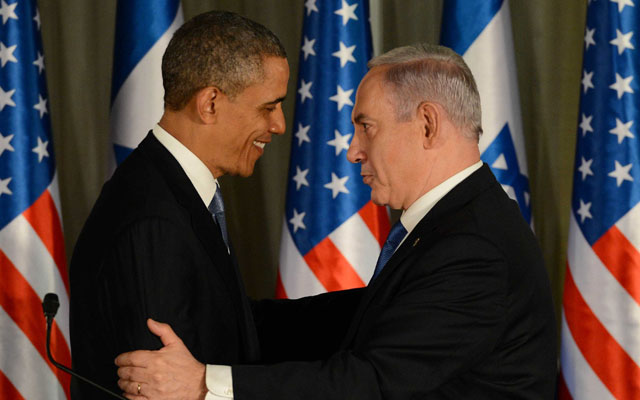KOBI GIDEON/G.P.O./SIPA/Newscom
President Obama wowed his youthful audience in Israel on Thursday.
Having arrived on Wednesday with a mere 10 percent approval rating, Obama clearly hoped to win Israeli hearts and minds with his almost hour-long speech. He went straight to the Israeli people with his pitch, eschewing a more traditional and formal address toIsrael’s parliament, the Knesset.
Israelis for their part were pleased to receive the warm embrace from Obama that they have been accustomed to from U.S. leaders, instead of the cold shoulder they have previously gotten from the Obama Administration.
Setting a mood of warm atmospherics, Obama talked about “my friend Bibi,” using Israeli Prime Minister Benjamin Netanyahu’s nickname. He spoke of the Israeli people’s history and their right to live in peace and security in their own land. He hailed Israel’s achievement as a society of entrepreneurs and inventors.
Eventually, Obama broached the topic of peace with the Palestinians and a two-state solution, asking his audience to push their politicians to seek a permanent solution. He also rather strangely encouraged Israel to reverse an “undertow” of international isolation, which commentators have pointed out actually arises from the hostility of Israel’s neighbors.
And regarding Iran’s nuclear program, Obama spoke of Israel’s right to defend itself and told Israelis repeatedly that we have their back. Israeli leaders are undoubtedly trying to gauge what exactly that means. Iran’s nuclear program will be the hangover that remains when all the warm fuzziness of the Obama visit has lifted.
Obama’s tour de force in public diplomacy cannot mask the nagging feeling that it may be mostly rhetoric. Arab audiences in Cairo were just as enthused by Obama four years ago when, at the beginning of his first term, he placed relations with the Arab world at the center of his foreign policy agenda. The President then dropped the ball on follow-through, dashing hopes and crushing expectations. This time, Obama’s reception among Palestinians was much less positive than among Israelis, as Palestinian demonstrations erupted and pictures of Obama were burned.
Speaking in Ramallah, Obama presented Palestinians with a different perspective than they had heard before—actually, a more realistic one. While he called Israeli settlement activity unhelpful, he did not call it “illegitimate” (thus modifying his Administration’s position), and he told Palestinians they have to come to the negotiating table without preconditions. Palestinians should not expect the Israelis to preemptively give up their position on settlements, he said, which would be a subject of negotiations.
Will the Obama Administration now put its weight behind achieving a negotiated Israeli–Palestinian two-state solution and get serious about the eradication of Iran’s dangerous nuclear program?
As noted yesterday at The Heritage Foundation’s Obama Doctrine event by Heritage senior fellow Kim Holmes, Obama does not want foreign policy to interfere with his domestic agenda, and his foreign policy therefore tends to be reactive, pragmatic, and cautious. The President seems to have concluded that reliance on Israel is a necessity in the highly unstable Middle East region, which it is. But that does not necessarily make him a dependable partner.
Source material can be found at this site.










